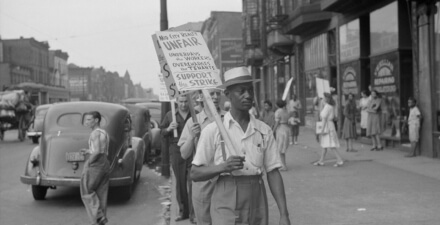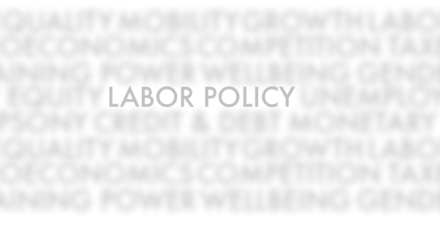Increasing evidence demonstrates the ways in which bargaining power shapes economic outcomes. One’s economic success is not merely defined by individual characteristics such as education. Equitable Growth’s work on unions and collective action in the United States examines the ways in which institutions intersect with economic trends and individual characteristics to ensure that workers can share in the gains of the economic growth to which they contribute.
Featured work
Will labor’s surging popularity result in new union members in the United States?
August 29, 2024
August 29, 2024
Unions in the United States improve worker safety and lower health inequality
December 13, 2022
December 13, 2022
Factsheet: How strong unions can restore workers’ bargaining power
May 1, 2020
May 1, 2020
Unions and the enforcement of labor rights: How organized labor protects U.S. workers against unfair and illegal employment practices
April 29, 2022
April 29, 2022
Aligning U.S. labor law with worker preferences for labor representation
February 18, 2020
February 18, 2020
Explore Content in Bargaining Power390
Workplace surveillance is becoming the new normal for U.S. workers
August 18, 2021
August 18, 2021
Myths about competition in the global economy harm humanity and our planet
August 11, 2021
August 11, 2021
July Jobs report: Job growth ramps up, but the construction sector struggles
August 6, 2021
August 6, 2021
NBER Summer Institute 2021 Round-up: Week 3
August 2, 2021
August 2, 2021
Expert Focus: From academia to the administration, Equitable Growth scholars transition to executive branch
July 27, 2021
July 27, 2021
NBER Summer Institute 2021 Round-up: Week 2
July 26, 2021
July 26, 2021
Excessive heat harms U.S. workers unequally as the safety risks from climate change soar
July 19, 2021
July 19, 2021
Temperature, workplace safety, and labor market inequality
July 19, 2021
July 19, 2021
Policymakers should ensure that the U.S. labor market recovery lasts by boosting workers’ bargaining power and strengthening social infrastructure
July 12, 2021
July 12, 2021
Explore the Equitable Growth network of experts around the country and get answers to today's most pressing questions!

















